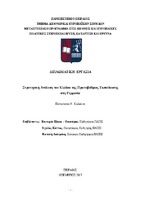Στρατηγική ανάλυση του κλάδου της Πρωτοβάθμιας Εκπαίδευσης στη Γερμανία

Master Thesis
Συγγραφέας
Καλάκου, Παναγιώτα Ν.
Ημερομηνία
2017-11Επιβλέπων
Πέκκα - Οικονόμου, ΒικτωρίαΠροβολή/
Λέξεις κλειδιά
Στρατηγική ανάλυση ; Ευρωπαϊκά εκπαιδευτικά πρότυπα ; Πρωτοβάθμια εκπαίδευση ; Γερμανία ; Strategic analysis ; SWOT analysis ; PEST analysis ; European educational standards ; Primary education ; GermanyΠερίληψη
Οι οικονομίες των κρατών της ευρωπαϊκής οικογένειας, για να μπορέσουν
ανταποκριθούν στις διαρκώς αυξανόμενες παγκόσμιες κοινωνικές προκλήσεις,
οφείλουν να μετεξελιχθούν σε οικονομίες ανταγωνιστικές και βιώσιμες, στηριζόμενες
στη γνώση και την εμπειρία. Ο κλάδος της εκπαίδευσης αποτελεί πρωταρχικό
παράγοντα ανάπτυξης της οικονομίας και της επιχειρηματικότητας των κρατών μελών
της Ευρωπαϊκής Ένωσης, αλλά η ανομοιογένεια του μαθητικού πληθυσμού, που
αποτελεί πλέον μία πραγματικότητα, δημιουργεί απορρύθμιση των εκπαιδευτικών
δομών και απαιτεί τη χάραξη νέων στρατηγικών σχεδίων και πολιτικών.
Στην παρούσα διπλωματική εργασία μελετήθηκε και αναλύθηκε η δομή, η
οργάνωση και η ποικιλία των τύπων εκπαίδευσης του γερμανικού συστήματος, στο
πλαίσιο ενός πολυπολιτισμικού περιβάλλοντος, και κυρίως του κλάδου της
πρωτοβάθμιας εκπαίδευσης. Αρχικά αναλύονται οι διαπολιτισμικές αρχές και τα
μοντέλα μεταναστευτικής εκπαιδευτικής πολιτικής ενώ στη συνέχεια, κάνοντας χρήση
των εργαλείων της στρατηγικής ανάλυσης, παρουσιάζεται και διασαφηνίζεται το
εσωτερικό και εξωτερικό περιβάλλον των εκπαιδευτικών οργανισμών της
πρωτοβάθμιας εκπαίδευσης, αναδεικνύοντας μεν τα δυνατά και αδύναμα σημεία τους,
δε τις ευκαιρίες, απειλές και τους πιθανούς κινδύνους του εξωτερικού περιβάλλοντος.
Μέσω της στρατηγικής αυτής ανάλυσης και της ανάδειξης του κλάδου της
πρωτοβάθμιας εκπαίδευσης της Γερμανίας, οριοθετούνται και προτείνονται ορισμένες
«βέλτιστες» εκπαιδευτικές πρακτικές και πρότυπα ευρωπαϊκά σχολικά προγράμματα
που συνδέονται με την καινοτομία, την αριστεία και την επιχειρηματικότητα στο
σχολείο. Το θεωρητικό πλαίσιο της εργασίας βασίζεται σε βιβλιογραφικές πηγές και
δεδομένα που αντλήθηκαν μέσω έγκυρων εγχειριδίων και ηλεκτρονικών πηγών.


